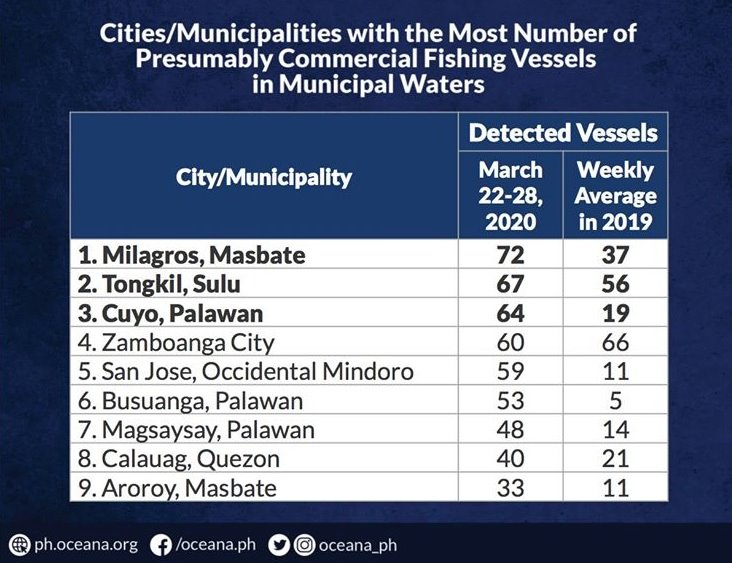
CEBU CITY, Philippines—Over 500 possible illegal fishing done by commercial fishing vessels for the week March 22 to 28, 2020 were detected in various municipal waters in the country, international non-government organization Oceana bared in an emailed press release.
“While national and local government agencies are busy performing frontline duties to combat the COVID-19 crisis, it was observed that some commercial fishing operators are exploiting it as an opportunity to violate the law,” said Atty. Gloria Estenzo Ramos, Oceana vice president.
For the week of March 22-28, Karagatan Patrol, the online platform for reporting of illegal fishing established by Oceana and the League of Municipalities of the Philippines, revealed that more than 500 possibly commercial fishing vessels were detected in some towns of Palawan, Masbate, Quezon and Zamboanga through the Visible Infrared Imaging Radiometer Suite (VIIRS).
The VIIRS is a satellite-based instrument that detects night lights at sea.
The most number of intrusions during the said week was detected in Milagros, Masbate in the Visayan sea with 72 detections of suspected fishing boats in commercial scale. This is double the weekly average number of commercial fishing vessels detected in 2019, which was only 37, Oceana pointed out.
“The figures showed that the threats to the ocean continue unabated with commercial fishing intrusion in the municipal waters still happening. Without the vessel monitoring technology in place, the violators cannot be tracked easily,” Ramos said.
Under RA 10654, which became effective in February 2015, the BFAR must implement a vessel monitoring measure that involves installing a tracking device on all commercial fishing boats so that their movement can be monitored. This is a requirement of law that has been delayed for the last five years.
With the delayed installation of boat tracking device as a requirement for commercial fishing registration and renewal, Oceana, through karagatanpatrol.org, a free web-based application, continues to monitor commercial fishing vessels’ behavior using the VIIRS.
“The VIIRS shows only lights emitted by fishing boats at night. There are also fishing boats that fish at day time and are not captured by the technology, hence, it is not an alternative to vessel monitoring technology,” Ramos said.
Aside from Milagros, Masbate, the other areas included in the top ten list for possible intrusions of commercial fishing are Tongkil, Sulu; Cuyo in Palawan; Zamboanga City; San Jose, Occidental Mindoro; Busuanga, Palawan; Magsaysay, Palawan; Calauag, Quezon; Aroroy, Masbate; and Unisan, Quezon.
Oceana then urged the Philippine National Police Maritime Group, Philippine Coast Guard, Philippine Navy, the Bureau of Fisheries and Aquatic Resources (BFAR) and coastal local governments to intensify monitoring and surveillance of municipal waters and protect them from intrusion by commercial fishing vessels.
Oceana has been providing information to the respective heads of the local governments of the high probability of intrusion of commercial fishing vessels in their municipal waters since Karagatan Patrol was launched in 2019.
“We appreciate that local governments and enforcement agencies for diligently conducting at-sea inspections related to COVID-19 but we also call on them to continue to monitor our municipal waters for fishery violations,” Ramos said.
She called on coastal local authorities to keep their enforcers alert while closely watching over the cases of coronavirus 2019 among their constituents.
“Our municipal waters provide food for our people including many marginalized sectors, more so at this time.” Ramos added.
According to Oceana chief executive officer Andy Sharpless, the oceans provide sustenance and jobs for hundreds of millions of people around the world.
“They are an essential source of life’s biodiversity on this incredible, and now seemingly smaller-than-ever, planet. We, and the world, need healthy and abundant oceans in the wake of this pandemic and other future global challenges to come,” Sharpless said.
Oceana is an international advocacy organization dedicated to protecting the world’s oceans.
Since 2014, Oceana has been working closely with national and local government agencies, civil society, fisherfolk and other stakeholders to restore the abundance of Philippine fisheries and marine resources. /bmjo